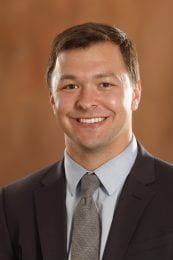Continuing the Leadership in Democracy blog series, Alex Kappus introduces his research examining the lived experience of college students involved in nonpartisan political activity during the 2020 election season. Alex has worked in college student affairs administration for over 10 years and is a Ph.D. Candidate in Michigan State University’s Higher, Adult, and Lifelong Education (HALE) program as well as a staff member at Central Carolina Community College in Sanford, North Carolina.
Between August and December 2020, I conducted interviews and focus groups with college students working to encourage their peers to be politically engaged. The students served as Democracy Fellows through the Campus Vote Project, an organization with a nonpartisan mission to promote student voting. Although the participants focused on voter registration and mobilization, they also promoted a wide range of nonpartisan activities, from organizing learning experiences, like Constitution Day, to moderating candidate forums, working the polls on election day, and more. In the midst of a turbulent election season and during a global pandemic no less, the students adapted, advocated, and contributed to historic youth voting rates. My study sought to illuminate the lived experience of nonpartisan political engagement and to understand how these experiences may influence student aspiration for future civic engagement.
A friend recently asked me, “Can someone really be nonpartisan?” The answer, at least according to my study’s participants, is yes and no. We all harbor personal opinions, and those ideas typically fall in line with entrenched partisan positions. Despite our internal inclinations about candidates and issues, however, we can exercise restraint in service to democracy.
Consider the various occupations calling for and even requiring a nonpartisanship, such as government employees, teachers, and certainly election officials. Participants in my study spoke of their commitment to nonpartisanship as a tool for inviting more of their peers into the process. Though painful at times to withhold their personal opinions, participants felt there were plenty of people telling folks what to think and how to vote, yet few working to demystify politics, government, and voting. They found opportunities to encourage accountability, such as recruiting volunteers from a diverse range of political backgrounds. By serving as approachable peer educators, they helped students learn about the purpose and process of democracy, while also creating spaces for their peers to formulate their own opinions about candidates and issues. Serving from a nonpartisan stance made hesitant college and university administrators more likely to partner on efforts to institutionalize political engagement efforts, but outside of political science classrooms, sadly participants were often on their own. Student-driven, peer-to-peer education could serve as one piece of a complex puzzle for improving student political participation.
In his thoughtful Jan. 26 blog post Dr. Kliewer wrote, “leadership learning and development becomes a project of shoring up internal tensions within the practice of democracy and working to create the conditions for productive disagreement in social, political, and economic spheres.” If leadership learning is to advance democracy, then students must learn about the role of politics and how they can contribute to and shape our democracy now and in the future. For far too long, civic engagement in higher education meant the promotion of apolitical service-learning activities. As the students in my study demonstrated, however, political does not need to mean partisan. Students gained valuable leadership skills about democracy by engaging in nonpartisan activities to foster learning across political differences among their peers.
I look forward to sharing my research in the coming months. The student’s up-close and personal accounts to strengthen democracy have the power to inspire, frustrate, and hopefully motivate action. Their commitment will offer insight to the many people working to reinvigorate higher education’s commitment to the political dimension of civic engagement.
What is your college or university doing to support student political participation? I invite you to share your thoughts with me (@akappus on Twitter and @alexkappus).
More about Alex Kappus, M.Ed.
Alex Kappus, M.Ed. (he/him/his) is a Ph.D. Candidate in the Higher, Adult, and Lifelong Education (HALE) program at Michigan State University and serves as a Success Coach and Instructor at Central Carolina Community College.
Alex has worked in a variety of capacities in higher education administration and student development for over 10 years, beginning at the University of Texas at Austin and most recently at Central Michigan University. Passionate about socially-responsible leadership development, Alex has hired, trained, and supervised over 1,000 undergraduate student leaders in a variety of peer-educator roles, including resident assistants, orientation mentors, and more.
He earned a Master’s in Education through the College Student Affairs Administration program at the University of Georgia and a Bachelor’s degree in Political Science from Emory University.
